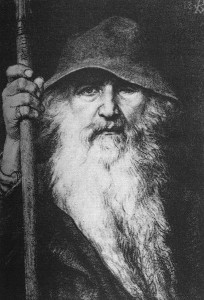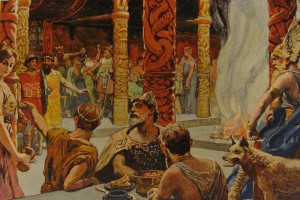
...it is easier to sail many thousand miles through cold and storm and cannibals, in a government ship, with five hundred men and boys to assist one, than it is to explore the private sea, the Atlantic and Pacific Ocean of one’s being alone.
Henry David Thoreau, „Walden“
In such a union „each element achieves completeness, not directly in a seperate consummation, but by incorporation in a higher pole of consciousness in which alone it can enter into contact with all others.“ (Teilhard de Chardin) Tillich was expressing the same thought when he denied that union with the Ground of Being means a loss of self in a larger whole. „If the self participates in the power of being-itself,“ said Tillich, „it receives itself back. For the power of being acts through the power of the individual selves. It does not swollow them as every limited whole, every collectivism, and every conformism does.“
Braden, „The Private Sea – LSD and the Search for God“
There are two souls living in my breast. Goethe said that. And I often feel the same way. On the one hand there is the „Anarch“ (Ernst Jünger), the free spirit („Freigeist“), the one, who dares to live without certainty and follows his own path… …and then there is the one, who follows more systematic approches to Mystery by more experienced magicians, the one, who needs some guarantee that he’s on the right track, someone who believes that someone ‘out there’ might have THE answers. Ironically these antagonistic forces in my soul led me once into the arms of the OTO. They promise freedom of speech and individualism, but practice dogma, rigidity, hierarchies and, ultimately, the subordination of the individual under certain ‘truths’ (read DOGMA=AMGOD). The fine line where freedom of speech ends and dogma begins is not easily seen, especially when you’re a 19 years old occultist, who believes in the Great White Brotherhood (I know why cynics exist). However, when I study the magical systems of others and try to follow their approaches to the Mystery, I always get stuck at some point where I begin to question some (or all) of their basic premises. This always leads me to the same conclusion: that I’m not a follower type, that I want to create my own philosophy and that there are Masters and Magicians who can help along the way, but there are no guarantees. If I may just quote a quote that resonated deeply with my being:
„Theoretical loyalty provides clear direction but is inherently limiting; theoretical anarchy enables flexibility but also inserts uncertainty…there are no fixed and correct ideas or methods…and therefore no inherently right ways…“
Just think about it: Theoretical Anarchy enables flexibility but also inserts Uncertainty! Don’t we all just yearn for that absolute certainty? But with absolute certainty Mystery ceases to exist. Hasn’t the world reached that point already? The way of the world is not my way… Uncertainty means freedom, certainty means dogma.
To trust my own instincts is the hard part of the equation. I do, but not all the time. However, doubts and conflicts have always been an important part of my path. They have often created a Need-Fire (Nauthiz), which led me to new horizons beyond what any magical model can describe as every model is „a map, not the reality“ (RAW). This dynamic of ‘friction-resistence-breakthrough’ was also behind the process to go beyond Crowley’s Thelemic model that finally culminated in the termination of my OTO membership in 2006 (and that dynamic is behind many other important processes that led to inner development). I regard this step as one of my most important ones towards an independent magical path.
In Occultism there is the tendency to explain everything, to package the Mystery in a formulae. Crowley’s teachings are full of such formulas and they explain a lot, but ultimately mean nothing. They may be used, but after all they cloth the Mystery in some costume. But this costume is not the Mystery itself. The Mystery is sensed in a certain state of consciousness (usually a kind of gnosis in a CM sense) and fills the seeker with awe. (Rudolf Otto described this awe in his work about The Holy and called the two emotions of man when he encounters the Divine mysterium tremendum and mysterium fascinans.) And after such an experience the seeker tries to rationalize what he experienced by creating certain correspondences between his experience and the system he’s using. He does this by assigning certain concrete elements of his experience to certain abstract qualities of his system-in-use. Too abstract? Ok, I give you an example:
Let’s say I invoke my Genius / HGA / Augoides / Wode-Self / Fylgja (what ever you want to call it – I’m not saying it’s all the same thing; the HGA seems to represent a combination of Wode-Self and Fylgja) and I’m deeply rooted in the Kabbalistic Psychocosm. If you invoke that part of your psyche in that system you will do it with surrender and love and, maybe, with submission. After you have established a rapport with your Deep Mind a voice starts speaking (not necessarily verbally, but visually or otherwise) that seems to come out of the core of your very existence (one-dimensional, uneducated and spiritually underdeveloped primates often think they met „God“). After this mysterious experience you turn towards your Tree of Life and assign that experience to Tiphareth. This corresponds to the Sun and the Heart. This again is connected to the Anahatha-Chakra, which leads to another chain of correspondences. In modern QBL these can be connected to the Hebrew aphabet and Tarot cards, so that finally a psychocosm full of correspondences is created. Too many are obsessed with the symbols, signs, correspondences, colours etc., so that they forget what the initial intention was behind to use them in the first place. And that’s basically to allow the mind to focus and use all those tools as keys for opening the doors of perception and thus to reach higher states of conciousness. BUT, once you are there, as Isreal Regardie never stopped emphasising, throw away the ladder, because you don’t need it anymore! All too often from such correspondences predetermined routes to „enlightenment“ (also known under its mysterious name „delusion“) are created that alienate the true seeker from the goal.
So, what is the goal? In my experience the first and foremost aim is to experience reality directly, without immediately conceptualising and contexualising the experience itself. Though I don’t deny the usefulness of certain concepts I realize that it’s all to easy to take the package for the content. Honestly said, I believe that my path has often revolved around CONCEPTS (package) explaining some of my (hardly to explain and hardly to accept) mystical and/or magical experiences (content). This, I believe, is the reason why Jan Fries said in my interview that „I believe that the individual is a lot more important than any system, religion, cult or school. And if you have to stick a label to yourself to do your thing you ain’t good enough yet.“
Labels, they give certainty, don’t they? Words are more real than reality – for most of us. But in truth we’re caught in our own prison of concepts most of the time.
Ludwig Feuerbach, the first real atheist we know of (maybe the Greeks had also some examples of what we think of as ‘atheists’ today) showed how to free man from the concept of a transcendental being called „God“. He was a German philosopher, who declared that God was nothing but the projection of human qualities in their perfected form. He argued that the superhuman deities of religion are involuntary projections of the essential attributes of human nature, and this projection, in turn, is explained by him by using a theory of human consciousness that is heavily indepted to Hegel. Feuerbach is really the unrecognised father of the criticism of religion, because whatever was interesting in Feuerbach has been taken up by Marx and Freud (I’m not saying they’re right), who formulated their theses in a more logical, coherent and systematic fashion. However, Feuerbach proved that ‘God’ is just a WORD (label). But wait, words are more real than reality, right? In the beginning was the word… and the word was God. (By negating the existence of God – after his daughter has died at a very early age – Feuerbach has been prohibited to publish his works.) But those of us who experienced the Divine (content) cannot believe in the explanations of religion (package). And isn’t it strange that those Christians, who encountered the Divine in mystical experiences (like Meister Eckhart, Jacob Böhme, Paracelsus, Giordano Bruno, Blaise Pascal etc.) were doomed by the Church and that the Fathers of Dogma (who are the fathers of fear) became the patrons of this alien creed called Christianity? Before they imposed their dogmas on our forefathers and foremothers we had no conception of THE Divine (as the “One God”), but experienced that quality of reality (or consciousness – after all, I don’t know, if it has an objective reality) in different forms (thus polytheism). So, if Feuerbach is right (albeit a materialist), then he is confirming the mystical premise that the Gods live in our breasts. Thus the projections of “the superhuman deities of religion” that man has created aren’t mere illusions of human consciousness, but become an essential expression of the divine nature of Consciousness itself (Óðr).
In this way the label “God” degenerated into a concept that man has to believe in, instead of being the vision of each man realizing the core of his very existence. (I finally have to read Emerson. I know that he had a lot to say about that.) This imprisonment to labels is the hypnotising effect of language itself and due to an “evolutionary error” in our brains to ceaselessly create meaning. Zen Masters and other Masters of Meditation developed all kinds of techniques –including shock techniques, gazing at walls for hours, silence, sensory deprivation, mantras, mudras, yantras etc. – to overcome that miserable condition, also known as the conditio humana.
What I learn from this is that being a chaos mystic – doing your own research, experiments, rituals, meditations asf., and trusting your own experiences and your own perception, asking any premise and any dogma, system or preacher – is the only way to go. We can learn from those who walked the Path before us (magicians and mystics), we can learn to read their sign posts (symbol systems) and explanations (philosophies), but after everything is said and done, whom will you trust when you’re in danger or when death approaches? Your guru, your system, your God?
My answer is: “No, I will trust mySelf.”
This Self, I believe, is part of the Divine energy of godhead that creates and maintains the universe, who is the Alföðr and whom the Einherjar called Óðinn.
Persistence is all. Search continues…







